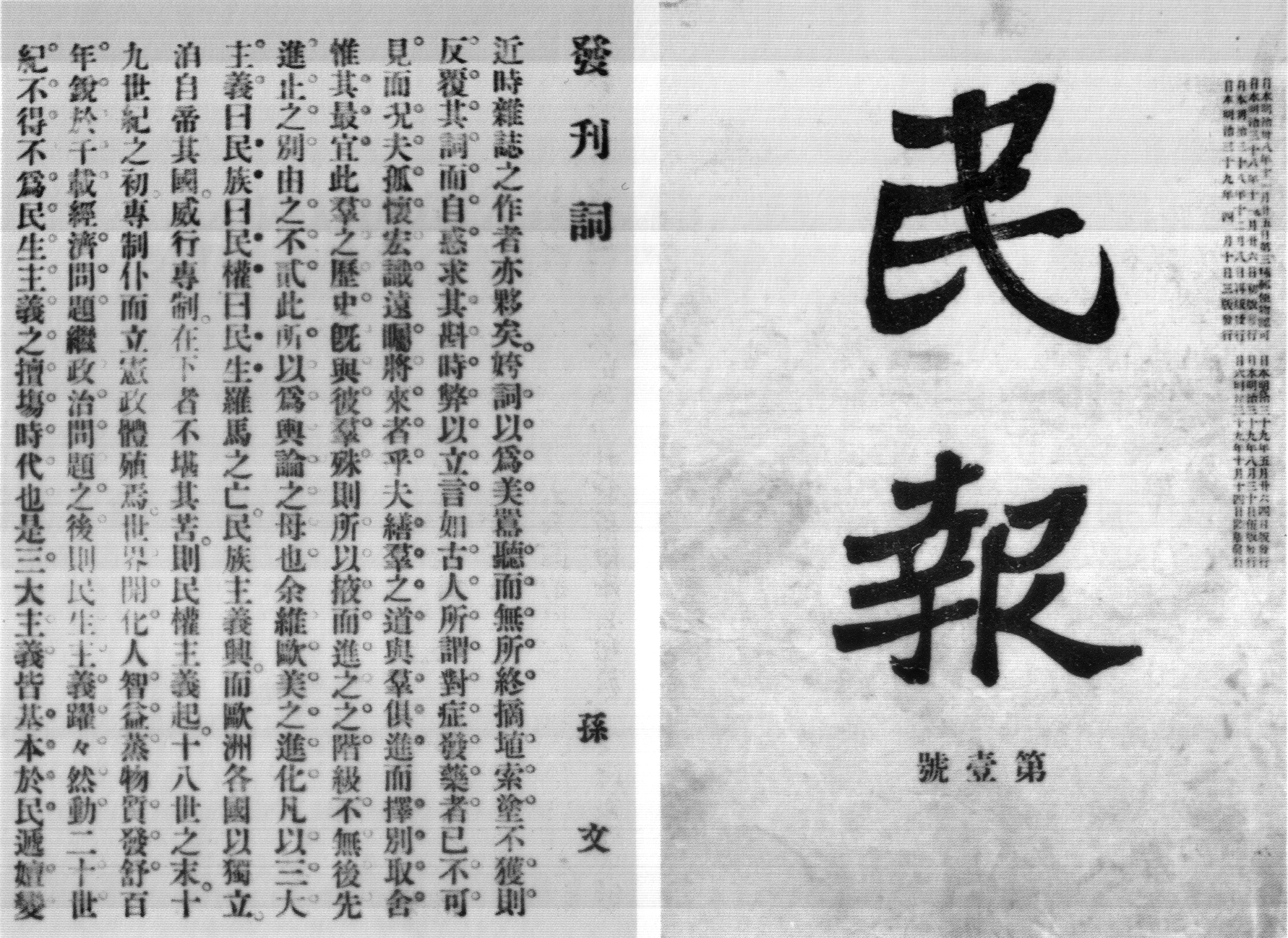|
San-min Doctrine
The Three Principles of the People (; also translated as the Three People's Principles, San-min Doctrine, or Tridemism) is a political philosophy developed by Sun Yat-sen as part of a philosophy to improve China made during the Republican Era. The three principles are often translated into and summarized as nationalism, democracy, and the livelihood of the people. This philosophy has been claimed as the cornerstone of the nation's policy as carried by the Kuomintang (KMT); the principles also appear in the first line of the national anthem of the Republic of China. Origins In 1894 when the Revive China Society was formed, Sun only had two principles: nationalism and democracy. He picked up the third idea, welfare, during his three-year trip to Europe from 1896 to 1898.Li Chien-Nung, translated by Teng, Ssu-yu, Jeremy Ingalls. ''The political history of China, 1840–1928''. Princeton, NJ: Van Nostrand, 1956; rpr. Stanford University Press. , . pp. 203–206. He announced all t ... [...More Info...] [...Related Items...] OR: [Wikipedia] [Google] [Baidu] |
Sun Yat-sen
Sun Yat-sen (; also known by several other names; 12 November 1866 – 12 March 1925)Singtao daily. Saturday edition. 23 October 2010. section A18. Sun Yat-sen Xinhai revolution 100th anniversary edition . was a Chinese politician who served as the first provisional president of the Republic of China and the first leader of the Kuomintang (Nationalist Party of China). He is called the "Father of the Nation" in the Republic of China, and the "Forerunner of the Revolution" in the People's Republic of China for his instrumental role in the overthrow of the Qing dynasty during the Xinhai Revolution. Sun is unique among 20th-century Chinese leaders for being widely revered in both Mainland China and Taiwan. Sun is considered to be one of the greatest leaders of modern China, but his political life was one of constant struggle and frequent exile. After the success of the revolution in 1911, he quickly resigned as president of the newly founded Republic of China and relinquished ... [...More Info...] [...Related Items...] OR: [Wikipedia] [Google] [Baidu] |
Nationalism
Nationalism is an idea and movement that holds that the nation should be congruent with the State (polity), state. As a movement, nationalism tends to promote the interests of a particular nation (as in a in-group and out-group, group of people),Anthony D. Smith, Smith, Anthony. ''Nationalism: Theory, Ideology, History''. Polity (publisher), Polity, 2010. pp. 9, 25–30; especially with the aim of gaining and maintaining the nation's sovereignty (self-governance) over its homeland to create a nation-state. Nationalism holds that each nation should govern itself, free from outside interference (self-determination), that a nation is a natural and ideal basis for a polity, and that the nation is the only rightful source of political power. It further aims to build and maintain a single national identity, based on a combination of shared social characteristics such as culture, ethnicity, geographic location, language, politics (or the government), religion, traditions and belief ... [...More Info...] [...Related Items...] OR: [Wikipedia] [Google] [Baidu] |
Manchus
The Manchus (; ) are a Tungusic East Asian ethnic group native to Manchuria in Northeast Asia. They are an officially recognized ethnic minority in China and the people from whom Manchuria derives its name. The Later Jin (1616–1636) and Qing (1636–1912) dynasties of China were established and ruled by the Manchus, who are descended from the Jurchen people who earlier established the Jin dynasty (1115–1234) in northern China. Manchus form the largest branch of the Tungusic peoples and are distributed throughout China, forming the fourth largest ethnic group in the country. They can be found in 31 Chinese provincial regions. Among them, Liaoning has the largest population and Hebei, Heilongjiang, Jilin, Inner Mongolia and Beijing have over 100,000 Manchu residents. About half of the population live in Liaoning and one-fifth in Hebei. There are a number of Manchu autonomous counties in China, such as Xinbin, Xiuyan, Qinglong, Fengning, Yitong, Qingyuan, Weichang, Kua ... [...More Info...] [...Related Items...] OR: [Wikipedia] [Google] [Baidu] |


